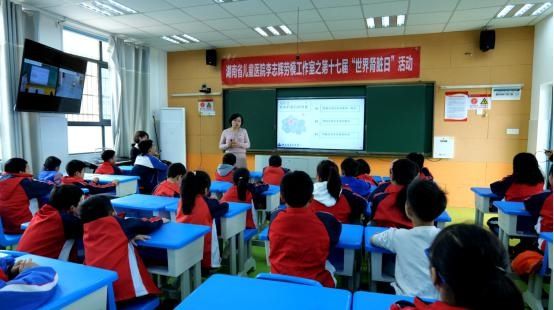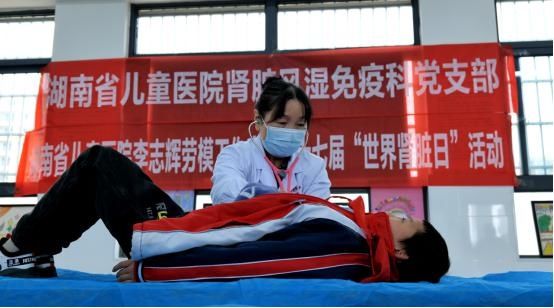March 10 is the 17th World Kidney Day. The expert team of Hunan Children’s Hospital “Li Zhihui Model Worker Innovation Studio” came to the Central Primary School of Yong’an Town, Liuyang City, to give health knowledge presentations to more than 2,200 local students, and to give Some students conduct free clinics. This is also one of the grassroots activities regularly carried out by the “Li Zhihui Model Worker Innovation Studio” since its establishment in 2019.

“Kidneys are like hard-working cleaners.” Childlike pictures, easy-to-understand health knowledge, from ” The young backbone physicians of “Li Zhihui Model Worker Innovation Studio” gave the children a happy science class. “Don’t be nervous, take it easy.” Professor Li Zhihui calmed the children’s emotions softly while doing a physical examination for the students. Li Zhihui said that how many sick children are in a free clinic is an individual case. Our goal is to allow more children to enjoy the best medical services and grow better.
Through the free clinic screening, it was found that some students had enlarged tonsils and caries. “Upper respiratory tract infection, skin infection, tonsillitis, etc. are important incentives for kidney disease and recurrent disease.” Li Zhihui, director and chief physician of the Department of Renal Rheumatology and Immunology, Hunan Children’s Hospital, introduced that many adult end-stage renal disease originated in children , is due to the fact that childhood diseases have not been diagnosed and treated early, and they continue to progress and worsen, eventually developing to end-stage renal disease. Routine urinalysis is an effective method for early detection of kidney disease. The hospital will also open a green channel to facilitate these children’s follow-up medical treatment.

Professor Li Zhihui is the recipient of the National “May 1st Labor Medal”. In 2019, the Provincial Health Union established the “Li Zhihui Model Worker Innovation Studio”. The studio includes outstanding young and middle-aged experts related to multi-disciplinary and innovative projects in Hunan Children’s Hospital, including internal, external, emergency, inspection and inspection. Since its establishment in 2019, a series of academic and caring activities have been carried out through online and offline academic seminars, difficult case discussions, appropriate technology promotion, and multi-center scientific research collaboration, training more than 7,000 primary medical staff, benefiting more than 3,000 primary and secondary school students. The innovative model worker studio model has played a leading role as a model worker in improving and driving the level and ability of children’s health services in the region.
[Link] Early detection of nephropathy in children
1. Recognize edema: edema of kidney disease is characterized by edema of the eyelids or face in the morning, and in severe cases it progresses to edema of the limbs, abdominal distention and whole body Edema.
2. Analysis of urine output: There are large individual differences in children’s urine output. Generally, daily urine output = (age -1) x100+400. Normal urine output is 1-3 ml/kg per hour for newborns, 400-500 ml per day for infants, 500-600 ml for toddlers, 600-800 ml for preschoolers, and 800-800 ml for school-aged children. 1400 ml. Whether increased or decreased urine output may be a manifestation of kidney disease, especially nocturnal polyuria is often a sign of chronic kidney disease.
3. Observing “Yan” Color: normal urine is yellow, clear liquid, if the child’s urine has abnormal color such as light red, brown, soy sauce, or foamy urine, it should be taken as soon as possible. Seek medical examination.
4. Tricky collection of specimens: When parents leave urine specimens for their children, the first urine in the morning is ideal. Because morning urine is more concentrated but acidic, with relatively many and complete formed components, no dietary factors interfere, and it does not affect the chemical determination of urine.
Xia Sheng, reporter of Xiaoxiang Morning News, Yao Jiaqi, Su Xiaoqin, correspondent